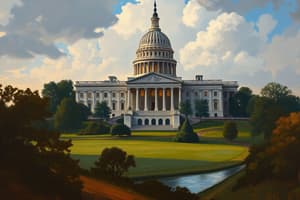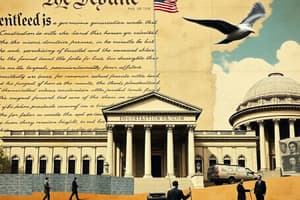Podcast
Questions and Answers
What is the Federal System?
What is the Federal System?
- System of government where powers are divided between the national government and state or local governments. (correct)
- System of government where powers are concentrated in the national government.
- System of government that only allows local governments to operate independently.
- System of government which does not exist.
What are expressed powers?
What are expressed powers?
Powers directly stated in the Constitution.
What are implied powers?
What are implied powers?
Authority required to carry out the powers that are expressly defined in the Constitution.
What is the Necessary and Proper Clause?
What is the Necessary and Proper Clause?
What are inherent powers?
What are inherent powers?
Which amendment reserves certain powers to the states?
Which amendment reserves certain powers to the states?
What are reserved powers?
What are reserved powers?
What are concurrent powers?
What are concurrent powers?
What law provided for the eventual statehood of territories settled by the U.S.?
What law provided for the eventual statehood of territories settled by the U.S.?
Which state was formed because they did not want to secede during the Civil War?
Which state was formed because they did not want to secede during the Civil War?
Which Article of the U.S. Constitution deals with the states' relationships among themselves?
Which Article of the U.S. Constitution deals with the states' relationships among themselves?
What does extradition mean?
What does extradition mean?
What does the Full Faith and Credit Clause entail?
What does the Full Faith and Credit Clause entail?
What is the Privileges and Immunities Clause?
What is the Privileges and Immunities Clause?
What are interstate compacts?
What are interstate compacts?
What are grants-in-aid programs?
What are grants-in-aid programs?
What is the nationalist position?
What is the nationalist position?
Which court case upheld the Supremacy Clause and the Necessary and Proper Clause?
Which court case upheld the Supremacy Clause and the Necessary and Proper Clause?
Which court case upheld a federal steamboat license despite state restrictions?
Which court case upheld a federal steamboat license despite state restrictions?
What was the significance of Fletcher v. Peck?
What was the significance of Fletcher v. Peck?
What did Worcester v. Georgia rule?
What did Worcester v. Georgia rule?
What are categorical grants?
What are categorical grants?
What are block grants?
What are block grants?
What are project grants?
What are project grants?
What court case outlawed 'quickie' divorces?
What court case outlawed 'quickie' divorces?
What was the ruling of Loving v. Virginia?
What was the ruling of Loving v. Virginia?
What was the outcome of United States v. Windsor?
What was the outcome of United States v. Windsor?
What did Obergefell v. Hodges require states to do?
What did Obergefell v. Hodges require states to do?
The tendency over the years has been to grant more power to the?
The tendency over the years has been to grant more power to the?
Which party is more likely to support a nationalist position?
Which party is more likely to support a nationalist position?
Which party is more likely to rely on the judgment of state and local governments?
Which party is more likely to rely on the judgment of state and local governments?
Flashcards are hidden until you start studying
Study Notes
Federal System Overview
- A federal system divides powers between national and state or local governments.
- This structure enhances coordination and allows for localized governance.
Definitions of Powers
- Expressed Powers: Clearly stated in the Constitution; examples include regulating interstate commerce and coining money.
- Implied Powers: Derived from expressed powers, enabling the government to carry out necessary functions; supported by the Necessary and Proper Clause.
- Inherent Powers: Powers exercised simply because it is a government, such as controlling borders.
- Reserved Powers: Powers not explicitly stated in the Constitution but retained by the states, ensuring states can govern locally.
- Concurrent Powers: Powers shared by both national and state governments, such as the ability to tax.
Constitutional Amendments and Articles
- 10th Amendment: Reserves powers to states not granted to the federal government.
- Article IV: Addresses the relationships among states, including issues like extradition and the Full Faith and Credit Clause.
Key Legal Cases
- McCulloch v. Maryland: Established the Supremacy Clause and validated implied powers through the Second National Bank case.
- Gibbons v. Ogden: Affirmed federal licensing over state licensing in commerce, solidifying federal authority.
- Fletcher v. Peck: Demonstrated judicial review with the first case declaring a state law unconstitutional.
- Worcester v. Georgia: Ruled states cannot impose restrictions on Native American lands, affirming federal treaties.
Clauses of the Constitution
- Full Faith and Credit Clause: Mandates recognition of public acts, records, and judicial proceedings across states.
- Privileges and Immunities Clause: Ensures that a state cannot discriminate against the citizens of another state.
Interstate Relations
- Interstate Compacts: Formal agreements between states to address shared concerns.
- Extradition: Process for returning fugitives to the state where the crime was committed.
Grants and Federal Aid
- Grants-in-Aid Programs: Federal resources provided to states and localities for various programs.
- Categorical Grants: Specific-purpose grants with imposed conditions.
- Block Grants: Broad-purpose grants with minimal restrictions.
- Project Grants: Competitively awarded based on project applications.
Historical Context of States
- Northwest Ordinance of 1787: Established a framework for admitting new states from territories.
- West Virginia: Formed during the Civil War by counties opposing secession.
Legislative and Social Progression
- Williams v. North Carolina: Outlawed quick divorces, impacting marriage laws.
- Loving v. Virginia: Ruled against bans on interracial marriage, reinforcing civil rights.
- United States v. Windsor: Declared the Defense of Marriage Act unconstitutional, contributing to marriage equality.
- Obergefell v. Hodges: Legally recognized same-sex marriage across all states.
Political Perspectives
- The Nationalist position favors increased federal power to address national issues.
- Democrats generally support a nationalist approach, while Republicans advocate for state and local governance autonomy.
Studying That Suits You
Use AI to generate personalized quizzes and flashcards to suit your learning preferences.




